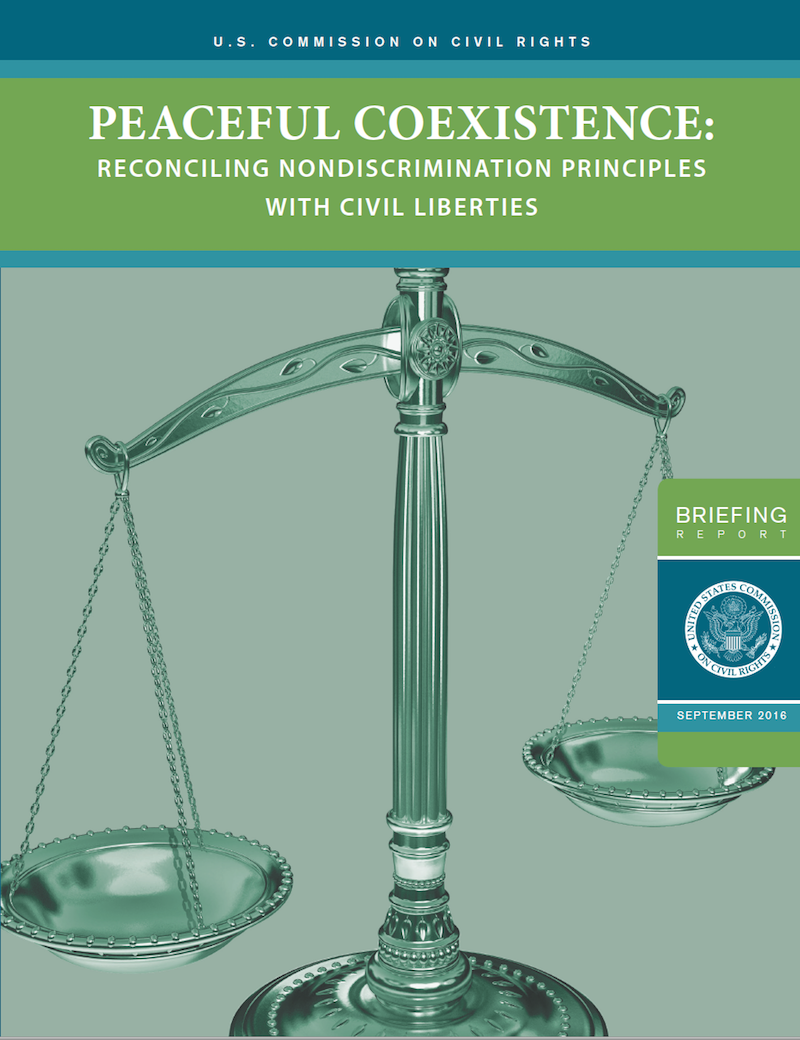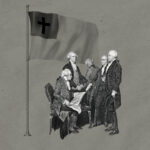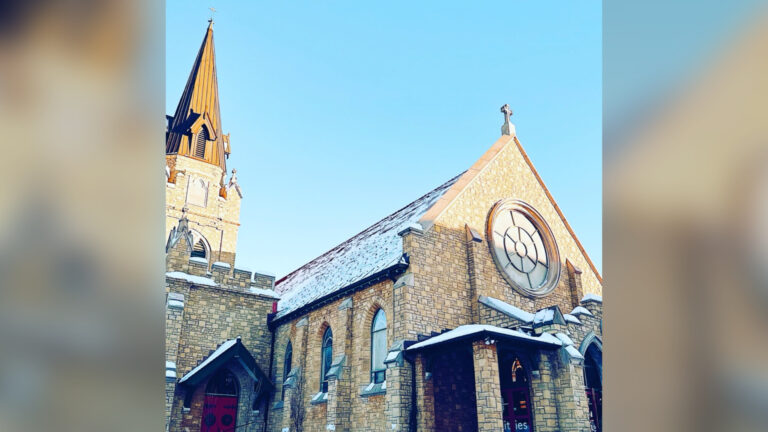The Story: Last week the U.S. Civil Rights Commission issued a report that implies religious believers’ support of religious liberty is often motivated more by hate than by adherence to God’s revelation.

The Background: The U.S. Commission on Civil Rights is an independent, bipartisan agency established by Congress in 1957 whose duties include appraising federal laws and policies with respect to discrimination or denial of equal protection of the laws because of “race, color, religion, sex, age, disability, or national origin, or in the administration of justice” and to submit reports, findings, and recommendations to the President and Congress. The commission’s latest briefing report is titled “Peaceful Coexistence: Reconciling Nondiscrimination Principles with Civil Liberties” and is intended to examine “the balance struck by federal courts, foremost among them the U.S. Supreme Court, in adjudicating claims for religious exemptions from otherwise applicable nondiscrimination law.”
The basic conclusion of the 306-page report is, “Religious exemptions to the protections of civil rights based upon classifications such as race, color, national origin, sex, disability status, sexual orientation, and gender identity, when they are permissible, significantly infringe upon these civil rights.” (Notice that the report includes “sexual orientation” and “gender identity” as protected categories despite those not being included in the commission’s mandate.)
The tenor of the report is an overall disdain for actions motivated by religion. But they make a minor concession in saying that “beliefs” can still receive First Amendment protections (however they say that “conduct” [i.e., acting on one’s beliefs] “should be constrained by statutory law”).
But the best example of the attitude in the document toward religious liberty is found in the statement of the commission’s chairman, Martin R. Castro, which is worth quoting in full:
“The government of the United States is not, in any sense, founded on the Christian religion.” — John Adams
The phrases “religious liberty” and “religious freedom” will stand for nothing except hypocrisy so long as they remain code words for discrimination, intolerance, racism, sexism, homophobia, Islamophobia, Christian supremacy or any form of intolerance.
Religious liberty was never intended to give one religion dominion over other religions, or a veto power over the civil rights and civil liberties of others. However, today, as in the past, religion is being used as both a weapon and a shield by those seeking to deny others equality. In our nation’s past religion has been used to justify slavery and later, Jim Crow laws. We now see “religious liberty” arguments sneaking their way back into our political and constitutional discourse (just like the concept of “state rights”) in an effort to undermine the rights of some Americans. This generation of Americans must stand up and speak out to ensure that religion never again be twisted to deny others the full promise of America.
Why It Matters: Ten years ago civil rights activist Chai Feldblum (who now serves as the commissioner of the Obama administration’s Equal Employment Opportunity) wrote,
It seemed to me the height of disingenuousness, absurdity, and indeed disrespect to tell someone it is okay to “be” gay, but not necessarily okay to engage in gay sex. What do they think being gay means?
I have the same reaction to courts and legislatures that blithely assume a religious person can easily disengage her religious belief and self-identity from her religious practice and religious behavior. What do they think being religious means?
While Feldblum recognizes that religious belief and conduct cannot be easily separated, she also said that when religious liberty and sexual liberty conflict, “I'm having a hard time coming up with any case in which religious liberty should win.”
Feldblum and other LGBT activists have historically been clear that sexual liberty would trump religious freedom. And for more than a decade some religious believers have warned that we should take them at their word when the activists said that “nondiscrimination” laws would require discarding Constitutional guarantees of religious freedom. Too many of our fellow Christians refused to listen, though, and even those who recognized the threat thought it would apply mostly to wedding photographer and bakers. Now they are shocked to find that churches may be forced to let biological males who identify as transgender women use the women’s bathroom.
A decade ago, Christians were too distracted to pay attention to the warnings. Will they listen now? As commission member Peter Kirsanow writes in the report, “The findings and recommendations in this report should serve as an alarm to liberty-loving Americans.” And as Roger Severino, director of the DeVos Center for Religion and Civil Society, says, “I would expect to see such a slanted and anti-religious report come out of China or France perhaps, but am disappointed to see it come from the U.S. Commission on Civil Rights.”
Unfortunately, if Christians don’t wake up to the reality of the threat we may soon find believers in France and China have more freedom to live as Christians than we do here in America.
Free eBook by Tim Keller: ‘The Freedom of Self-Forgetfulness’
 Imagine a life where you don’t feel inadequate, easily offended, desperate to prove yourself, or endlessly preoccupied with how you look to others. Imagine relishing, not resenting, the success of others. Living this way isn’t far-fetched. It’s actually guaranteed to believers, as they learn to receive God’s approval, rather than striving to earn it.
Imagine a life where you don’t feel inadequate, easily offended, desperate to prove yourself, or endlessly preoccupied with how you look to others. Imagine relishing, not resenting, the success of others. Living this way isn’t far-fetched. It’s actually guaranteed to believers, as they learn to receive God’s approval, rather than striving to earn it.
In Tim Keller’s short ebook, The Freedom of Self-Forgetfulness: The Path To True Christian Joy, he explains how to overcome the toxic tendencies of our age一not by diluting biblical truth or denying our differences一but by rooting our identity in Christ.
TGC is offering this Keller resource for free, so you can discover the “blessed rest” that only self-forgetfulness brings.


































